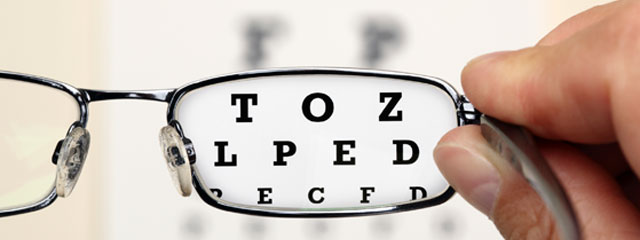
Faye Bradus, a resident at Stein Assisted Living in Somerset, remembers how it felt when she started losing her eyesight. “I began noticing a problem about 20 years ago,” she says. “I lost sight in one eye and was diagnosed with macular degeneration and had bleeding behind my eyeball.” Laser treatments scarred the back of her eyeball and the now 97-year-old was not a candidate for any of the new corrective procedures available to many others.
According to an article by Dr. David M. Quillen entitled, “Common Causes of Vision Loss in Elderly Patients” on the American Family Physician website, vision loss – such as the condition experienced by Faye Bradus – is a major health care problem among the elderly. “Approximately one person in three has some form of vision-reducing eye disease by the age of 65,” asserts Quillen. He points out the most common causes of vision loss among the elderly include macular degeneration, glaucoma, cataract and diabetic retinopathy.
“Age-related macular degeneration is characterized by the loss of central vision. Primary open-angle glaucoma results in optic nerve damage and visual field loss. Because this condition may initially be asymptomatic, regular screening examinations are recommended for elderly patients,” advises Quillen. “Cataract is a common cause of vision impairment among the elderly, but surgery is often effective in restoring vision. Diabetic retinopathy may be observed in the elderly at the time of diagnosis or during the first few years of diabetes. Patients should undergo eye examinations with dilation when diabetes is diagnosed and annually thereafter,” he notes.
Coming to terms with her vision loss was a life-changing experience for Bradus, which required her to keep a positive outlook for her future. “When I first noticed that I was losing my sight, it was rough but I learned to accept it and cope,” she shares. “For the first few years, it was difficult seeing the numbers on buses or houses, and progressively it got worse. The worst part was that I couldn’t shop very well because I couldn’t see the labels on the food and needed to ask for help. I was also afraid to cross the street by myself. I needed assistance. I would hear the car before I would see the car and I used a lot of taxi services,” remembers Bradus.
Friends and family members searching for ways to help a loved one cope with vision loss can find encouragement from these tips offered by Nichole Baxter’s article, “How to Help Someone Who Is Visually Impaired” on the website, All About Vision.com:
- Ask your eye care practitioner about special optical devices called low vision aids which can help people use their remaining vision more effectively. These aids include customized magnifiers, computerized text to speech devices and handheld or spectacle-mounted telescopes for seeing objects in the distance.
- Non-optical aids, such as audio books, large-print books, and other large print items, can also help make life more enjoyable for those with low vision.
- Adjust living areas of those with low vision by ensuring that their home includes the following features: well-lit with high-wattage light bulbs and additional lamps, free of clutter and organized, a list of important telephone numbers (doctors,family/friends, transportation, emergency contacts) in large print.
- You may also want to use brightly colored tape to mark stairs or slopes in the home. Eye-catching colors that contrast with the flooring work best!
- Using a large TV screen, taking shopping trips to the mall or grocery store with someone who does not have low vision can make simple trips to the store a lot easier.
- Create a list before taking your trip, and stay nearby incase you have a hard time reaching items and completing purchases.
Other resources are NJ State Library- Talking Books and Braille, [email protected], 800-792-8322 ext 823 or 804. Commission of the Blind and Visually Impaired- 877-685-8878 or [email protected] – They have many vision aides that can be provided.
Although Faye has had many physical challenges as her diseased has progressed, she notes that the aides and staff at Stein Assisted Living have been supportive and helpful. “I thought that I would need more help and that I needed to go to a nursing home, but I have all the help I need at Stein,” she says. When asked about how she would advise others dealing with vision loss to cope with their condition, Bradus says, “It is all about your attitude and learning to accept whatever comes your way and make the most of every single day.”
The Oscar and Ella Wilf Campus for Senior Living is comprised of Stein Assisted Living, Jaffa Gate Memory Care Neighborhood, Stein Hospice, Wilentz Senior Residence, Wilf Transport, Wilf At Home, and The Foundation at the Wilf Campus. For more information, contact us at (732) 568-1155, [email protected] or visit us at www.wilfcampus.org.
